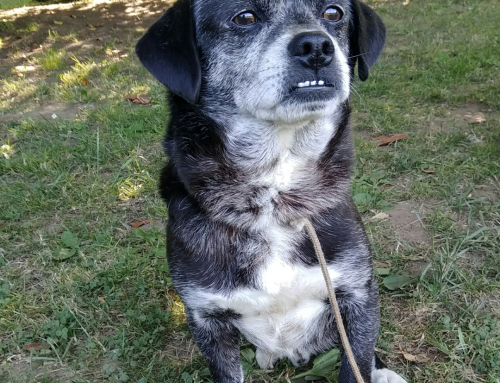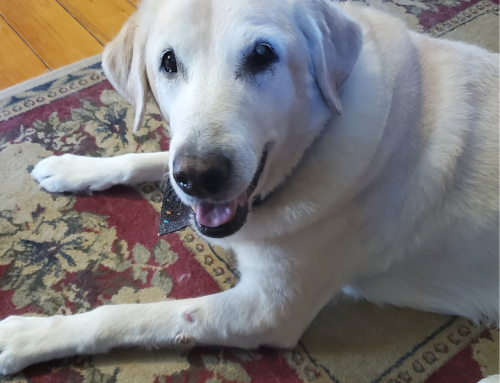Part of what makes Pawsitively Fit different is that we insist on having a phone conversation with owners before they can book an appointment. This is for two reasons:
1. To make sure they are appropriate for rehab with us
2. To ensure they don’t need to see the vet before they see us.

In physiotherapy we often refer to red flags. Red flags are signs of serious issues that require prompt care. While to our knowledge, this term isn’t quite used the same in canine care, here’s a list of our own red flags that might prompt us to believe your dog should be going to the vet!
Note: this list is not exhaustive. There are many reasons your dog should seek vet care, we have compiled some of the more vague or less obvious reasons.
Lethargy
Lethargy refers to a state of extreme tiredness or lack of energy. It is a common symptom of various underlying health issues and can indicate that something is not right with your dog. Lethargy may be a sign of illness or infection, pain or discomfort, fever, various chronic health conditions or be a side effect of medication.
It can be easy to assume a dog with reduced energy is just succumbing to age, but it is important to consult with your vet to determine any underlying cause that can be treated. Additionally, keep an eye out for other accompanying symptoms such as loss of appetite, vomiting, diarrhea, difficulty breathing, or any other concerning signs. Providing your vet with detailed information about your dog’s behavior and any other symptoms will assist in making an accurate diagnosis.
Hair Loss
Abnormal hair loss in dogs, also known as alopecia, can be caused by various factors, ranging from normal shedding to underlying health conditions. Some potential causes of hair loss include:
- Allergies. Dogs can develop allergies to environmental factors (such as pollen or dust mites) or certain ingredients in their food. Allergies often cause itching and scratching, leading to hair loss. Skin irritation, redness, or rashes may also be present.
- Parasites. External parasites like fleas, ticks, and mites can cause hair loss in dogs. These parasites irritate the skin, leading to itching, scratching, and hair breakage. Check for signs of infestation, such as visible parasites, flea dirt, or irritated skin.
- Infections. Bacterial or fungal infections can cause localized or generalized hair loss. These infections can affect the hair follicles and result in patchy or thinning hair. Skin may appear red, inflamed, or have a foul odor.
- Hormonal Imbalances. Hormonal issues, such as hypothyroidism or Cushing’s disease, can lead to hair loss in dogs. These conditions affect the normal functioning of the endocrine system, resulting in changes to the coat, including hair loss.
- Nutritional Deficiencies. Poor diet or nutrient deficiencies can affect the health of a dog’s coat. Inadequate levels of essential fatty acids, vitamins, or minerals may contribute to hair loss. Proper nutrition is crucial for a healthy coat.
- Stress or Anxiety. Dogs experiencing significant stress, anxiety, or behavioral issues may exhibit hair loss as a result of excessive licking, chewing, or scratching.
- Autoimmune Disorders. Certain autoimmune conditions, such as lupus or pemphigus, can cause hair loss in dogs. These conditions occur when the immune system mistakenly attacks the body’s own cells, including hair follicles.
It’s important to consult with a veterinarian if your dog is experiencing hair loss for unexplained reasons. They can perform a thorough examination, evaluate your dog’s medical history, and conduct any necessary tests to determine the underlying cause of the hair loss. Treatment will depend on the specific diagnosis and may involve addressing the underlying condition, managing symptoms, or adjusting the dog’s diet or environment.

Exercise Intolerance
Reduced ability to by physically active is another issue often blamed on aging. While this could be the case, it is important to ensure your dog is otherwise healthy by visiting your vet. Exercise intolerance could be caused by issues with the respiratory system including the lungs or the trachea, cardiovascular issues (i.e. issues with the heart), pain from injury or arthritis, carrying excess weight (i.e. being overweight or obese), metabolic disorders like hypothyroidism or diabetes, anemia or an intolerance to heat.
Again, it’s easy to brush off symptoms of exercise intolerance but these changes to warrant a proper physical exam to rule-out any underlying health issues.
Muscle Loss
Muscle loss or atrophy can be due to obvious things such as inactivity or disuse following injury or surgery. It can also be due to other issues that are best treated by your vet. These include malnutrition or inadequate diet, chronic illness or disease (i.e. kidney disease and hypothyroidism) and neurological disorders.
All dogs lose muscle mass with ageing. This is called sarcopenia, but there are usually controllable factors that can reverse or slow muscle loss. Again, it’s important to ensure your dog is overall healthy before chalking up muscle loss to age alone.


Noisy or Raspy Breathing
Some dog breeds are known for being noisy breathers such as bulldogs or pugs. Breeds like these, which are known as brachycephalic breeds, have short snouts and flat faces and are prone to respiratory issues due to their unique anatomy. They often have narrowed airways, elongated soft palates, or stenotic nares (narrow nostrils). Some of these dogs may require surgical correction so a vet visit is still important if your dog is of this type.
Other causes of noisy breathing include infection of the upper or lower respiratory tract, allergies, tracheal collapse in which the cartilage of the trachea becomes soft and weak making it more difficult for air to flow (common in small dogs such as Yorkies and Shitzus), foreign objects in the airway, laryngeal paralysis (you can learn more here about his condition) and heart issues. As you can see, there are a wide variety of things that can cause noisy breathing and it’s best for your vet to investigate.
Relatively quick increase or decrease in body weight without known cause
Weight loss or gain in a short period of time without intention is cause for concern. Sudden weight loss should always set off alarm bells for some underlying health issue and a trip to the vet is always warranted. Causes of sudden weight loss may be cancer or metabolic issues. Other more obvious issues may include dental issues that make it painful to eat or gastric issues.
Weight gain can be due to very identifiable reasons such as reduced activity or overeating. Some less obvious reasons may include hormonal imbalances, fluid retention from an underlying health issue or a medication side effect. Weight changes should be discussed with your vet.

Sudden Functional Decline
A sudden change in ability will always cause me to tell someone to get in touch with their vet asap. This may be an emergency and should be treated as one. Sudden functional changes are rapid deteriorations in either physical or cognitive abilities. Potential causes may be:
- Illness or infection
- Trauma or injury such as a significant fall or hit by car
- Neurological disorders such as intervertebral disc disease or strokes
- Acute pain
- Medication side effects
- Cardiovascular issues
What does this all mean?
It can be very easy to shrug off many changes that occur with our dogs as just being old. However, it’s important to know that while aging makes many conditions more likely, age itself is NOT a disease. Any new or unusual symptoms show be examined with scrutiny, likely with the help of your vet, to determine if concern or treatment is warranted.
If all turns out well, or even if you dog requires treatment, but they still have issues that need work such as strength, mobility or pain, then it’s time for us to get to work!




